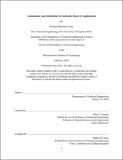| dc.contributor.advisor | Jensen, Klavs F. | |
| dc.contributor.author | Canty, Richard Benjamin | |
| dc.date.accessioned | 2024-03-13T13:25:33Z | |
| dc.date.available | 2024-03-13T13:25:33Z | |
| dc.date.issued | 2024-02 | |
| dc.date.submitted | 2024-01-18T18:34:58.534Z | |
| dc.identifier.uri | https://hdl.handle.net/1721.1/153673 | |
| dc.description.abstract | Automated experimental systems, which provide a means to accelerate scientific research and the discovery of application-driven materials, are specialized and limited in scope. The inability to pivot to new research areas has driven a shift in design to create generalized systems and incorporate decision logic to grant systems autonomy. The incorporation of autonomy enables flexible and adaptable operation but complicates automation. In this thesis, autonomy for operation execution and workflow design was integrated into an automated platform for molecular discovery. This integration required adapting control architectures to handle goal-oriented commands, advancing scheduling strategies to orchestrate concurrent and evolving workflows, and developing modular interfaces to facilitate workflow mutation and the incorporation of real-time decision logic. For control, a master controller orchestrated platform tasks while a separate database provided platform instruments with current information on samples, workflows, and platform resources. This enabled executive control through high-level commands which could be translated into concrete actions by the agent at run-time using current platform information and available instrument capabilities. For scheduling, a greedy algorithm was developed to handle the simultaneous execution of multiple workflows with temporal constraints between tasks and whose tasks and operational details could change. This provided a way to accommodate the adaptability and agency of the platform’s systems, ensure sample integrity, and prevent resource and operational conflicts. Workflows were designed with modular, high-level tasks and were self-contained to allow platform agents to mutate the workflow without requiring knowledge of other workflows or the implementation-level details of other agents’ operations. Hardware modules utilized an inverted modular design whereby each task they were programmed to accomplish was injected into their parent controller rather than every controller enforcing a standard set of operations on their children. This enabled every agent to make flexible use of its decision logic with access to a suite of context-specific commands. Further exploring the ideas of autonomy, an algorithm was developed to assist the platform in selecting alternative reaction conditions to improve reaction yields. The data-driven approach imitates a chemist by considering conditions from related reactions then evaluating trust in those conditions by the number and quality of successful reactions that are similar to these related reactions to determine new conditions | |
| dc.publisher | Massachusetts Institute of Technology | |
| dc.rights | In Copyright - Educational Use Permitted | |
| dc.rights | Copyright retained by author(s) | |
| dc.rights.uri | https://rightsstatements.org/page/InC-EDU/1.0/ | |
| dc.title | Autonomous experimentation for molecular discovery applications | |
| dc.type | Thesis | |
| dc.description.degree | Ph.D. | |
| dc.contributor.department | Massachusetts Institute of Technology. Department of Chemical Engineering | |
| dc.identifier.orcid | 0000-0002-2347-2743 | |
| mit.thesis.degree | Doctoral | |
| thesis.degree.name | Doctor of Philosophy | |
